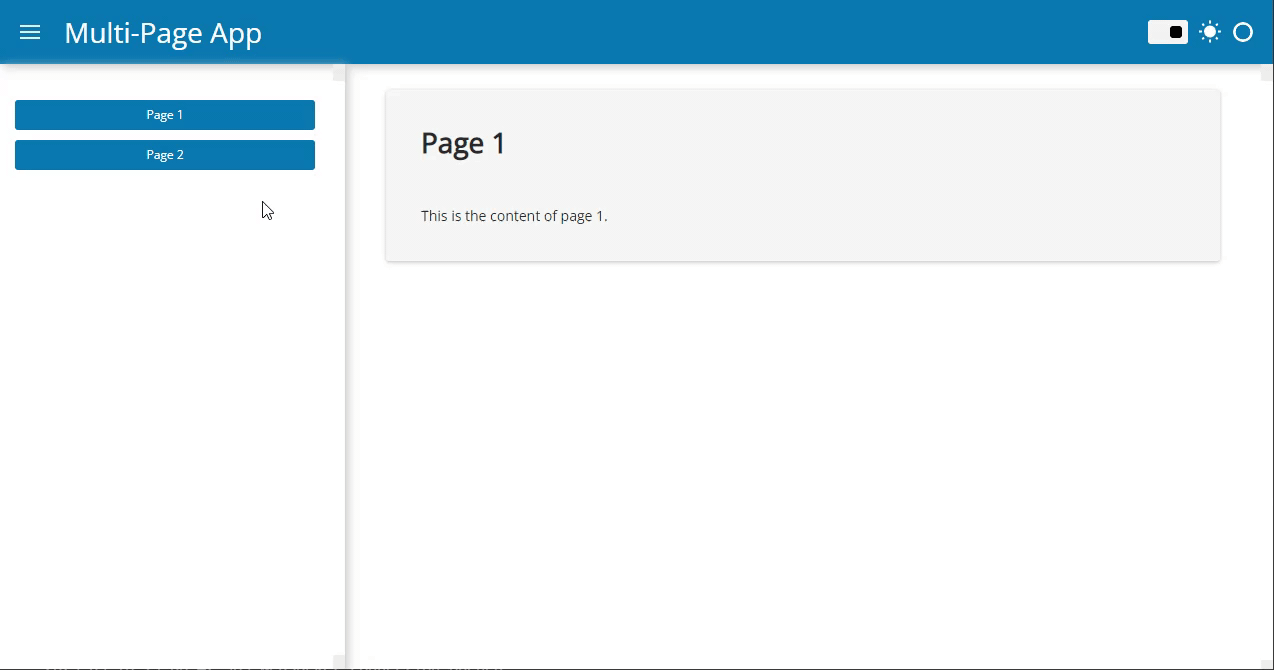Hi,
So I would to ask for some assistance troubleshooting an issue I am running into when creating a dynamic single page app that can serve various pages within it. I did study over the examples provided in these areas to get more clarification:
While my implementation tried to emulate “Option 3” from resource 1 - I do not believe I may have done so correctly. Here is a copy of basic framework I am trying to build. Also, would you have any suggestions when I start to look at implementing a few heavier calculation based pages and avoid making the app sluggish?
A final observation I made was that when I tested the code without using a template, it could successfully travel between the pages but just didn’t look too stellar.
First Implementation (No template but works):
import panel as pn
pn.extension()
class Page1:
def __init__(self):
self.content = pn.Column("# Page 1", "This is the content of page 1.")
def view(self):
return self.content
class Page2:
def __init__(self):
self.content = pn.Column("# Page 2", "This is the content of page 2.")
def view(self):
return self.content
pages = {
"Page 1": Page1(),
"Page 2": Page2(),
}
def show_page(page_instance):
main_area.clear()
main_area.append(page_instance.view())
page1_button = pn.widgets.Button(name="Page 1", button_type="primary")
page2_button = pn.widgets.Button(name="Page 2", button_type="primary")
page1_button.on_click(lambda event: show_page(pages["Page 1"]))
page2_button.on_click(lambda event: show_page(pages["Page 2"]))
# Create an Accordion for the collapsible sidebar menu
sidebar_menu = pn.Accordion(
("Pages", pn.Column(page1_button, page2_button))
)
sidebar_menu.active = [] # None means all sections are collapsed by default
sidebar = pn.Column(sidebar_menu)
main_area = pn.Column(pages["Page 1"].view())
app = pn.Row(sidebar, main_area)
app.servable()
Second Implementation (Using material template but does not work):
import panel as pn
from panel.template import MaterialTemplate
pn.extension()
# Define pages as classes
class Page1:
def __init__(self):
self.content = pn.Column("# Page 1", "This is the content of page 1.")
def view(self):
return self.content
class Page2:
def __init__(self):
self.content = pn.Column("# Page 2", "This is the content of page 2.")
def view(self):
return self.content
# Instantiate pages and add them to the pages dictionary
pages = {
"Page 1": Page1(),
"Page 2": Page2(),
}
# Function to show the selected page
def show_page(page_instance):
main_area.clear()
main_area.append(page_instance.view())
# Define buttons to navigate between pages
page1_button = pn.widgets.Button(name="Page 1", button_type="primary")
page2_button = pn.widgets.Button(name="Page 2", button_type="primary")
# Set up button click callbacks
page1_button.on_click(lambda event: show_page(pages["Page 1"]))
page2_button.on_click(lambda event: show_page(pages["Page 2"]))
# Create the sidebar
sidebar = pn.Column(page1_button, page2_button)
# Create the main area and display the first page
main_area = pn.Column(pages["Page 1"].view())
# Create the Material Template and set the sidebar and main area
template = MaterialTemplate(
title="Multi-Page App",
sidebar=sidebar,
main=main_area,
)
# Serve the Panel app
template.servable()
